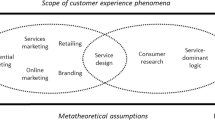Abstract
Consumer well-being involves not only the pursuit of pleasure, but also the pursuit of meaning. However, little is known about how people perceive the costs and benefits of meaning- versus pleasure-oriented experiences. We find that compared to pleasure-oriented experiences, people expect meaning-oriented experiences to be more satisfying after meeting a minimum time investment (i.e., the perceived minimum amount of time needed to derive benefits from consumption; study 1). As a consequence, people choose to prolong their exposure to meaningful (vs. pleasurable) experiences following interruptions (study 2). We discuss the implications of minimum time investments for firms’ relationships with consumers and marketing communication design (web appendix).


Similar content being viewed by others
Data Availability
All materials and data are available at the following OSF repository: https://osf.io/bgckx/?.
References
Alba, J. W., & Williams, E. F. (2013). Pleasure principles: A review of research on hedonic consumption. Journal of Consumer Psychology, 23(1), 2–18.
Baumeister, R. F., Vohs, K. D., Aaker, J. L., & Garbinsky, E. N. (2013). Some key differences between a happy life and a meaningful life. The Journal of Positive Psychology, 8(6), 505–516.
Cohen, J. B., Pham, M. T., & Andrade, E. B. (2008). The nature and role of affect in consumer behavior. In Handbook of consumer psychology (pp. 297–348). Routledge
Deci, E. L., & Ryan, R. M. (2008). Self-determination theory: A macrotheory of human motivation, development, and health. Canadian Psychology / Psychologie Canadienne, 49(3), 182–185. https://doi.org/10.1037/a0012801
Duckworth, A. L., Peterson, C., Matthews, M. D., & Kelly, D. R. (2007). Grit: Perseverance and passion for long-term goals. Journal of Personality and Social Psychology, 92(6), 1087.
Dwyer, R. J., Dunn, E. W., & Hershfield, H. E. (2017). Cousins or conjoined twins: How different are meaning and happiness in everyday life? Comprehensive Results in Social Psychology, 2(2–3), 199–215.
Frederick, S., & Loewenstein, G. (1999). Hedonic adaptation. In D. Kahneman, E. Diener, & N. Schwarz (Eds.), Well-being: The foundations of hedonic psychology (pp. 302–329). Russell Sage Foundation.
Kashdan, T. B., Biswas-Diener, R., & King, L. A. (2008). Reconsidering happiness: The costs of distinguishing between hedonics and eudaimonia. The Journal of Positive Psychology, 3(4), 219–233.
Kim, J., Kang, P., & Choi, I. (2014). Pleasure now, meaning later: Temporal dynamics between pleasure and meaning. Journal of Experimental Social Psychology, 55, 262–270.
King, L. A., & Hicks, J. A. (2021). The science of meaning in life. Annual Review of Psychology, 72, 561–584.
King, L. A., Hicks, J. A., Krull, J. L., & Del Gaiso, A. K. (2006). Positive affect and the experience of meaning in life. Journal of Personality and Social Psychology, 90(1), 179.
Liu, W., & Aaker, J. (2008). The happiness of giving: The time-ask effect. Journal of Consumer Research, 35(3), 543–557.
Locke, E. A., & Latham, G. P. (2006). New directions in goal-setting theory. Current Directions in Psychological Science, 15(5), 265–268.
Mead, N. L., & Williams, L. E. (2022). Can’t buy me meaning? Lay theories impede people from deriving meaning and well-being from consumption. Current Opinion in Psychology, 46, 101332.
Mead, N. L., & Williams, L. E. (2023). The pursuit of meaning and the preference for less expensive options. Journal of Consumer Research, 49(5), 741–761.
Mogilner, C., & Aaker, J. (2009). “The time vs. money effect”: Shifting product attitudes and decisions through personal connection. Journal of Consumer Research, 36(2), 277–291.
Nelson, L. D., & Meyvis, T. (2008). Interrupted consumption: Disrupting adaptation to hedonic experiences. Journal of Marketing Research, 45(6), 654–664.
Oliver, M. B., & Raney, A. A. (2011). Entertainment as pleasurable and meaningful: Identifying hedonic and eudaimonic motivations for entertainment consumption. Journal of Communication, 61(5), 984–1004.
Peterson, C., Park, N., & Seligman, M. E. (2005). Orientations to happiness and life satisfaction: The full life versus the empty life. Journal of Happiness Studies, 6, 25–41.
Preacher, K. J., & Hayes, A. F. (2004). SPSS and SAS procedures for estimating indirect effects in simple mediation models. Behavior Research Methods, Instruments, & Computers 36, 717–731.
Rudd, M., Catapano, R., & Aaker, J. (2019). Making time matter: A review of research on time and meaning. Journal of Consumer Psychology, 29(4), 680–702.
Seligman, M. E., & Csikszentmihalyi, M. (2000). Positive psychology: An introduction. American Psychologist, 55(1), 5–14.
Soman, D. (2003). Prospective and retrospective evaluations of experiences: How you evaluate an experience depends on when you evaluate it. Journal of Behavioral Decision Making, 16(1), 35–52.
Wang, X., Sun, Y., & Kramer, T. (2021). Ritualistic consumption decreases loneliness by increasing meaning. Journal of Marketing Research, 58(2), 282–298.
Zauberman, G. (2003). The intertemporal dynamics of consumer lock-in. Journal of Consumer Research, 30(3), 405–419.
Acknowledgements
The authors thank Philip Fernbach, Bart de Langhe, John Lynch, A. Peter McGraw, Nick Reinholtz, Margaret Campbell, Kathleen Vohs, and the CU Boulder LEAD Lab for their valuable feedback on this paper.
Author information
Authors and Affiliations
Corresponding author
Ethics declarations
Competing Interests
The authors declare no competing interests.
Additional information
Publisher's Note
Springer Nature remains neutral with regard to jurisdictional claims in published maps and institutional affiliations.
Supplementary Information
Below is the link to the electronic supplementary material.
Rights and permissions
Springer Nature or its licensor (e.g. a society or other partner) holds exclusive rights to this article under a publishing agreement with the author(s) or other rightsholder(s); author self-archiving of the accepted manuscript version of this article is solely governed by the terms of such publishing agreement and applicable law.
About this article
Cite this article
Carter, E.P., Williams, L.E. & Light, N. Consumers’ minimum time investments in meaningful consumption. Mark Lett (2023). https://doi.org/10.1007/s11002-023-09709-z
Accepted:
Published:
DOI: https://doi.org/10.1007/s11002-023-09709-z




